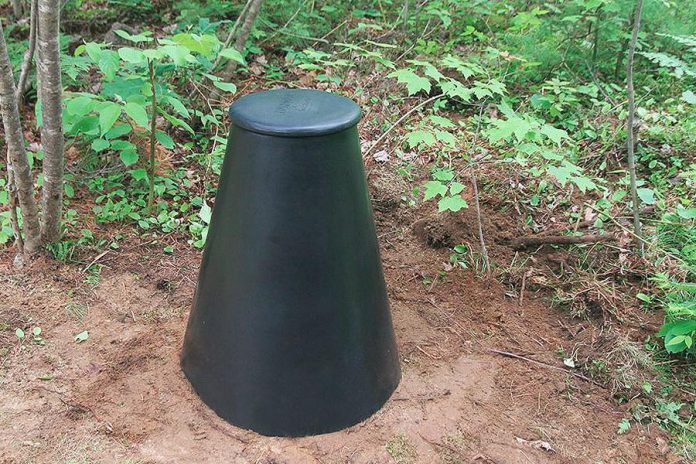
The days are growing longer and many of us our dreaming of warmer days and the approach of spring. Inevitably, the snow will disappear and we will encounter a winter’s worth of neglected dog waste in public parks — and maybe in our own backyards too.
No one wants to encounter this kind of waste, especially along trails or in parks and children’s play areas. It smells bad, it’s unsightly, and it contains parasites and bacteria such as E. coli, which pose a potential serious health risk.
It is also worth noting that the City of Peterborough has a bylaw requiring any person who owns or controls a dog to promptly remove any feces left by the animal on any property within the city other than the property of the dog owner.
Before we tackle this annual shoulder-season phenomenon, we can first consider how we might sustainably manage this particular kind of waste. I am going to let the cat out of the bag: the most environmentally friendly way to dispose of dog waste is to flush it down the toilet.
The plumbing and infrastructure to deal with feces is already in place in your home. Flushing dog poop allows it be to treated alongside human waste at the Wastewater Treatment Plant. The only cautionary note with this option relates to the type of bag you use to pick up the waste. The bag cannot be flushed, even if it is made of cellulose and claims to be biodegradable. If flushed, doggie bags can clog your household or municipal plumbing.
The next best solution to dealing with dog waste is to compost it in your own backyard using a digester. A digester is a container that promotes anaerobic decomposition of organic materials, by means of decomposition, without requiring air or direct sunlight.
This spring, the GreenUP Store (378 Aylmer St., Peterborough) will be carrying the Bardmatic Digester, produced by Techstar Plastics in Port Perry, Ontario. It is made from 100% black recycled polyethylene, which absorbs heat from the sun and further promotes decomposition. Digesters may also be available from your local municipality or online retailers, and there are also many DIY versions online.
The Bardmatic Digester is a great waste management solution for households because it is designed not only for dog waste, but also for all organic kitchen waste. This includes table scraps, citrus fruits, vegetable peelings, tea leaves, coffee grounds, and eggshells along with things that you can’t put in a backyard composter, such as meat and bones.
In terms of installation, the ideal spot for a Bardmatic Digester is one that gets lots of sun, is protected from the wind, and has good drainage. It is also advisable that you situate the digester away from your vegetable patch and any waterway.
A digester must be installed three feet (or approximately one metre) into the ground, so it’s best to “call before you dig” to ensure you won’t impact any below ground cables or utilities. The hole must be this deep to ensure that the materials you throw in will be below ground level, and so that enzymes and heat can work effectively to break things down.
You’ll want to dig the hole slightly larger than the bottom of the digester, which is roughly 80 centimetres in diameter. Place the digester in the hole, ensuring that it is level, then backfill and plant grass seed or wild flowers to assist in drainage. The Bardmatic Digester is 100 centimetres tall and weighs roughly five kilograms.
Household materials that cannot go into your digester include plastic, metal, chemicals, paper, rubber, glass, or other heavily processed materials including cellulose dog waste bags marked as compostable or biodegradable. Typically, these plant-based bags will only decompose in an open-air compost unit, where there is direct sunlight. In a digester, these bags melt into a waterproof layer around dog waste, which only allows the smelly liquid to accumulate — yuck.
In terms of managing the waste of felines, there are additional variables to consider. In Peterborough, a municipal bylaw requires outdoor cats to be leashed or contained to their yard but, even so, cats tend to do their business inconspicuously and make the extra effort to bury their feces.
This waste nevertheless posses a potential serious health risk to humans and ecosystems, in that it contains a myriad of bacteria and parasites. Cat feces can contaminate soil and ground water, eventually leeching into our waterways and thereby affecting aquatic flora and fauna.
So, what are we supposed to do with cat poop? Ultimately, this particular kind of waste should be disposed of in the garbage, so long as it doesn’t account for more than 25 per cent of your weekly household waste output. Flushing cat waste is not an option because municipal sewage treatment plants cannot remove some of the more malignant parasites.
For this same reason, used kitty litter should never be flushed down the toilet, even if it claims to be flushable. There are renewable and environmentally friendly litter alternatives on the market that are made of sawdust, corn kernels, and shredded newspaper but they still must stay out of your digester and conventional compost unit; all cat litter is best managed in the garbage.
In an effort to make pet ownership more sustainable, we can take matters into our own backyards (or bathrooms). We can be diligent in our collection of dog waste while out in public areas, and be committed to composting or flushing it.
As conscious consumers, we can make the effort to select compostable and renewable kitty litter alternatives, bearing in mind the toxicity of cat feces and the need to carefully dispose of this waste. Pets offer a tremendous benefit to our mental health and well being; with a little extra effort and consideration we can significantly reduce their environmental paw print.


























